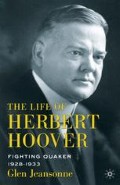Abstract
If Jimmy Carter was the twentieth century’s most useful former president, Herbert Hoover was the most useful chief executive in the years before he became president. Hoover demonstrated selfless humanitarianism, organizational virtuosity, stamina, and fortitude. In 1928, many Americans believed these achievements and his impeccable character outweighed any lack of political experience as qualifications for the presidency.
Access this chapter
Tax calculation will be finalised at checkout
Purchases are for personal use only
Preview
Unable to display preview. Download preview PDF.
Notes
Maude Stratton, Herbert Hoover’s Home Town: The Story of West Branch (1948; Wichita, KS: Macy Genealogy Project, 2000)
Mitchell V. Charnley, The Boy’s Life of Herbert Hoover (New York, 1931), 264.
David Burner, Herbert Hoover: A Public Life (New York, 1979), 6;
Martin Fausold, The Presidency of Herbert C. Hoover (Lawrence, KS, 1985), 1–3; Stratton, Herbert Hoover’s Home Town, 62.
Herbert Hoover, Hoover after Dinner (New York, 1933), 125–32
Herbert Hoover, Hoover after Dinner (New York, 1933), 125–32; Eugene Lyons, Herbert Hoover: A Biography (Garden City, NY, 1964), 6–7; Herbert Hoover to Lewis L. Strauss, Presidential Papers (hereafter PP), Subject File (hereafter SF), Box 1, Christmas, 1933, HHPL. In this letter Hoover describes his Quaker beliefs in impressive detail.
Herbert Hoover, Hoover after Dinner (New York, 1933), 125–32; Eugene Lyons, Herbert Hoover: A Biography (Garden City, NY, 1964), 6–7; Herbert Hoover to Lewis L. Strauss, Presidential Papers (hereafter PP), Subject File (hereafter SF), Box 1, Christmas, 1933, HHPL. In this letter Hoover describes his Quaker beliefs in impressive detail.
Burner, A Public Life, 6–7, 11–12; Hoover, Hoover after Dinner, 126–33; Kendrick A. Clements, Hoover, Conservation, and Consumerism: Engineering the Good Life (Lawrence, KS: 2000), 11.
Burner, A Public Life, 10–11; George H. Nash, The Life of Herbert Hoover: The Engineer, 1874–1914 (New York, 1983), 8–12
Harold Wolfe, Herbert Hoover: Public Servant and Leader of the Loyal Opposition (New York, 1956), 15
Richard Norton Smith, An Uncommon Man: The Triumph of Herbert Hoover (New York, 1984), 65–66.
Joan Hoff, Herbert Hoover: Forgotten Progressive (Boston, 1975), 10–11
Hal Elliott Wert, Hoover, the Fishing President: Portrait of the Private Man and His Life Outdoors (Mechanics-burg, PA, 2005), 46; Wolfe, Public Servant, 17.
Burner, A Public Life, 18–19; George H. Nash, Herbert Hoover and Stanford University (Stanford, CA, 1988), xi–xii, 15–19; Charnley, The Boys’ Life of Herbert Hoover, 67–70; Hoff, Forgotten Progressive, 11; Ray Lyman Wilbur, “Herbert Hoover: A Personal Sketch,” 6–7, PreCommerce Papers (PCP), SF, Box 26, Articles about or by Herbert Hoover, HHPL.
Nancy Beck Young, Lou Henry Hoover: Activist First Lady (Lawrence, KS, 2004), 7–12.
Hoff, Forgotten Progressive, 12–13; Wolfe, Public Servant, 19–20; Wert, The Fishing President, 69; “American Romances—II, Herbert Clark Hoover,” The Delineator, March 1920, p. 8, PCP, SF, Box 32, HHPL.
Wert, The Fishing President, 71–73; Wolfe, Public Servant, 23–24; Herbert Hoover, “History, June 17th to 23rd, 1900 [an account of the Boxer Rebellion siege],” 1–11, PCP, SF, Box 30, China—Boxer Rebellion, HHPL; Dale Mayer, Lou Henry Hoover: A Prototype for First Ladies (Hauppauge, NY, 2004), 106.
Nash, The Life of Herbert Hoover: The Humanitarian, 1914–1917 (New York, 1988), 29–33, 86–96, 124; Burner, A Public Life, 72–83, 94; Speech by Lou Henry Hoover on the CRB, Oct. 1915, PCP, SF, Box 32, HHPL.
Johnson Brigham, “Herbert C. Hoover, Mining Engineer—World Promoter—Philanthropist—Chief Conserver of the Nation’s Food Resources,” May 15, 1918, pp. 7–8
George H. Nash, The Life of Herbert Hoover: Master of Emergencies, 1917–1918 (New York, 1996), 34–40
Ray Lyman Wilbur, The Memoirs of Ray Lyman Wilbur, eds. Edgar Eugene Robinson and Paul Carroll Edwards (Stanford, CA, 1960), 260–61.
David Hinshaw, Herbert Hoover: American Quaker (New York, 1950), 108–17
Nash, The Life of Herbert Hoover: Master of Emergencies, 465–504; Wolfe, Public Servant, 52–53, 73–79; Burner, A Public Life, 114–30; David Hinshaw, Herbert Hoover: American Quaker (New York, 1950), 108–17; Vance McCormick Diary, Paris Peace Conference, 1919, pp. 47, 83–117, PCP, SF, Box 48, HHPL.
Herbert Hoover, The Memoirs of Herbert Hoover, vol. 2, The Cabinet and the Presidency, 1920–1933 (New York, 1952), 10–12
Royal J. Schmidt, “Hoover’s Reflections on the Versailles Treaty,” in Herbert Hoover: The Great War and the Aftermath, 1914–1923, ed. Lawrence E. Gelfand (Iowa City, IA, 1979), 61–83
Herbert Hoover, The Ordeal of Woodrow Wilson (New York, 1958). Hoover, as a former president, is on the whole sympathetic to Wilson.
Gary Dean Best, “The Hoover-for President Boom of 1920,” Mid-America 35, no. 4 (Oct. 1971), 227–22
Louis W. Liebovich, Bylines in Despair: Herbert Hoover, the Great Depression, and the U.S. News Media (Westport, CT: 1994), 14–17.
Hoff, Forgotten Progressive, 85–86, 103–5, 110–14; Fausold, The Presidency of Herbert C. Hoover, 16–17; Wolfe, Public Servant, 96–100; Burner, A Public Life, 146, 159–61, 168–71; Ray Lyman Wilbur and Arthur Mastick Hyde, The Hoover Policies (New York, 1937), 102–15.
Bruce Alan Lohof, “Herbert Hoover and the Mississippi Valley Flood of 1927: A Case Study of the Political Thought of Herbert Hoover” (PhD diss., Syracuse University, 1968), 55, 95–96, 131–32, 165; Hoff, Forgotten Progressive, 115–16; John M. Barry, Rising Tide: The Great Mississippi Flood of 1927 and How It Changed America (New York, 1997), 262–66. Lohof is the best single source, because he focuses specifically on Hoover’s role in flood rescue and relief. Barry is a more general, popular account of the flood as a whole.
Copyright information
© 2012 Glen Jeansonne
About this chapter
Cite this chapter
Jeansonne, G. (2012). Prologue: The Long Dusty Road from West Branch. In: The Life of Herbert Hoover. Palgrave Macmillan, New York. https://doi.org/10.1057/9781137111890_1
Download citation
DOI: https://doi.org/10.1057/9781137111890_1
Publisher Name: Palgrave Macmillan, New York
Print ISBN: 978-1-349-28769-7
Online ISBN: 978-1-137-11189-0
eBook Packages: Palgrave History CollectionHistory (R0)

